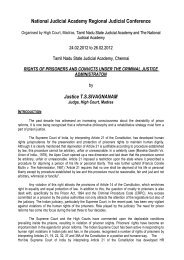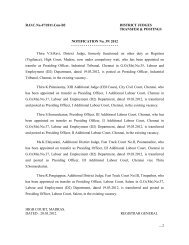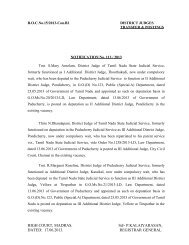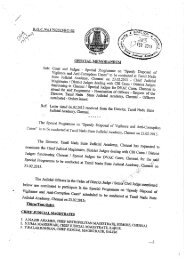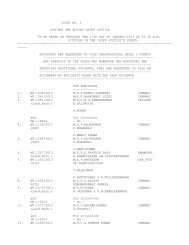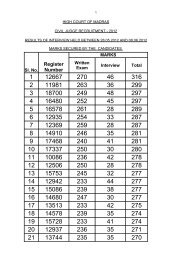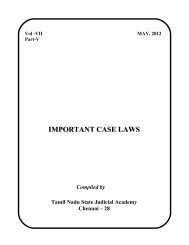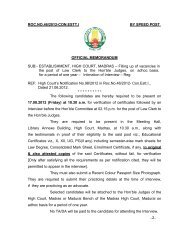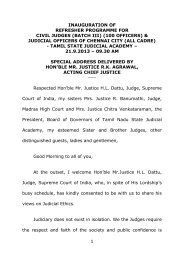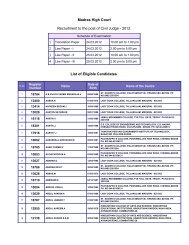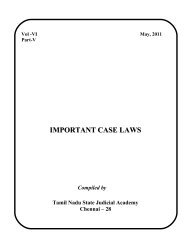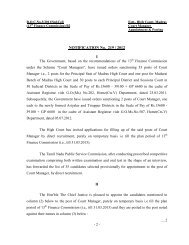Appreciation of Evidence in Sessions Cases - Justice D.Murugesan
Appreciation of Evidence in Sessions Cases - Justice D.Murugesan
Appreciation of Evidence in Sessions Cases - Justice D.Murugesan
Create successful ePaper yourself
Turn your PDF publications into a flip-book with our unique Google optimized e-Paper software.
(4). CONFESSION<br />
(a). What is Confession ?<br />
A ‘‘Confession’’ must either be an express acknowledgement <strong>of</strong> guilt <strong>of</strong> the <strong>of</strong>fence charged,<br />
certa<strong>in</strong> and complete <strong>in</strong> itself, or it must admit substantially all the facts which constitute the <strong>of</strong>fence.<br />
In Sahib s<strong>in</strong>gh vs. State <strong>of</strong> Haryana (AIR 1997 SC 3247) the Hon’ble Apex Court has held thus,<br />
“42. Section 24 provides, though <strong>in</strong> the negative form, that ‘Confession’ can be treated as relevant<br />
aga<strong>in</strong>st the person mak<strong>in</strong>g the confession unless it appears to the Court that it is rendered irrelevant on<br />
account <strong>of</strong> any <strong>of</strong> the factors, namely, threat, <strong>in</strong>ducements, promises etc. mentioned there<strong>in</strong>. Whether the<br />
‘Confession’ attracts the frown <strong>of</strong> Section 24 has to be considered from the po<strong>in</strong>t <strong>of</strong> view <strong>of</strong> the confession<br />
<strong>of</strong> the accused as to how the <strong>in</strong>ducement, threat or promise from a person <strong>in</strong> authority would operate <strong>in</strong> his<br />
m<strong>in</strong>d. (See Satbir S<strong>in</strong>gh V. State <strong>of</strong> Punjab (1977 (2) SCC 263)). “Confession has to be affirmatively<br />
proved to be free and voluntary. (See Hem Rah Devilal v. State <strong>of</strong> Ajmer (AIR 1954 SC 462)). Before a<br />
conviction can be based on “confession”, it has to be shown that it was truthful.<br />
43. Section 25 which provides that a Confession made to a Police Officer shall not be proved<br />
aga<strong>in</strong>st the person accused <strong>of</strong> an <strong>of</strong>fence, places complete ban on the mak<strong>in</strong>g <strong>of</strong> such confession by that<br />
person whether he is <strong>in</strong> custody or not. Section 26 lays down that confession made by a person while he is<br />
<strong>in</strong> custody <strong>of</strong> a Police Officer shall not be proved aga<strong>in</strong>st him unless it is made <strong>in</strong> the immediate presence<br />
<strong>of</strong> a Magistrate. Section 27 provides that when any fact is discovered <strong>in</strong> consequence <strong>of</strong> <strong>in</strong>formation<br />
received from a person accused <strong>of</strong> any <strong>of</strong>fence who is <strong>in</strong> the custody <strong>of</strong> a Police Officer, so much <strong>of</strong> such<br />
<strong>in</strong>formation, whether it amounts to a confession or not, as relates to the fact thereby discovered, may be<br />
proved. Section 27 is thus <strong>in</strong> the form <strong>of</strong> a proviso to Sections 24, 25 and 26. Section 164, 281 463 <strong>of</strong> the<br />
Code <strong>of</strong> Crim<strong>in</strong>al Procedure are the other provisions deal<strong>in</strong>g with confession and the manner <strong>in</strong> which it is<br />
to be recorded.”<br />
(b). General Corroboration:-<br />
In Madi Ganga vs. State <strong>of</strong> Orissa (AIR 1981 SC 1165) the Hon’ble Apex Court has held that,<br />
“6. .... It is now well settled that <strong>in</strong> order to susta<strong>in</strong> a conviction on the basis <strong>of</strong> a confessional<br />
statement it is sufficient that the general trend <strong>of</strong> the confession is substantiated by some<br />
evidence which would tally with the contents <strong>of</strong> the confession. General corroboration is sufficient<br />
vide Subramania Goundan V. State <strong>of</strong> Madras (AIR 1958 SC 66). ....”<br />
(c). Incrim<strong>in</strong>at<strong>in</strong>g fact without establish<strong>in</strong>g the guilt:-<br />
Admission – Incrim<strong>in</strong>at<strong>in</strong>g fact without establish<strong>in</strong>g the guilt <strong>of</strong> the maker is not a confession –<br />
Kanda Padayachi vs. State <strong>of</strong> Tamil Nadu – AIR 1972 SC 66.<br />
9



